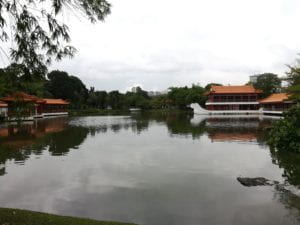SINGAPORE
Anmei
Nicole and I started our journey in Singapore, which I think was a smart decision. We were able to get the hang of navigating (both of us are hopeless with directions) and speaking with strangers, all while on familiar stomping grounds. Also, it was a chance to learn more about the place we live in: some of the people here, their histories, and how they interact with the communities around them.
We spent our first day exploring Singapore’s Chinatown, where we spoke to a man who led me to have second thoughts about our project’s central question. He was our tour guide at the Chinatown Heritage Centre museum and, surprisingly, a sociology major with a special sensitivity towards others. He confided that although he had more Hokkien blood in him, he felt more connected to Cantonese culture through his close relationship with his grandmother, who emigrated from China. Our tour guide declared himself to ultimately identify as a Singaporean but shrugged his shoulders and planted a question in our heads: does it really matter if we can pinpoint our identities? He remarked that having Chinese blood does not necessarily mean that one identifies as a “Chinese”. Having, for instance, an Italian passport does not mean that one will automatically identify as an “Italian”. In the globalized world that we currently live in, so many individuals are “global citizens” who have mixed, ambiguous, or fluctuating identities. Because technology and modernity have made it easier to move across borders or be connected to the entire world, a lot of us identify with more than one place. Why do we feel a need to have one shaped identity? Is it merely due to social conditioning? Racial and ethnic labels have been created by society, after all, and the need to “find an identity” by selecting an appropriate label might be something that social institutions have taught us or pushed us to do. But if racial or ethnic identities, as we can define them, are just products of the large, evil social machine, then what’s the point of dissecting one’s identity anyway? This question continued to linger in my mind as Nicole and I progressed in our travels.
The next day, we spoke with our friend Xianda’s parents, first-generation Chinese immigrants, and our friend Esther, a third-generation Chinese immigrant, about their experiences in Singapore. It was nice to hear these two stories on the same day because I realized that the passage of time can drastically change the immigrant experience. While Xianda’s parents firmly replied that they would always identify as 华人 (Huaren, or ethnically Chinese people) and had even considered moving back to China, Esther was initially confused about why we wanted to interview her about her Chinese immigrant experience because she identifies as strictly Singaporean. Esther’s grandmother emigrated from Hainan to Singapore, and Esther admitted to us that after her grandmother died, a lot of the Chinese traditions that the family practiced died with her. In this way, it seemed that immigrants after the first generation may be increasingly assimilated to their host country and less connected to the country of their roots. This is something I certainly feel in my own family: my parents, first-generation immigrants, are more comfortable with Chinese culture and language than I am, and I am more comfortable with American culture than they are. I noticed this phenomenon when I was younger, and it used to make me feel a little sad that I was, in some ways, “losing” my “Chineseness” as I spent more and more time in the States. But listening to Xianda’s parents and Esther speak, I felt that what it means to be ethnically Chinese can change depending on one’s experiences in different cultural environments–and that’s okay. Being more adapted to a different country doesn’t necessarily mean that parts of your Chinese identity have disappeared; it could mean that you relate to your Chinese blood and roots in a different way or that you’re adding on to what being “Chinese” encompasses.
On our third day in Singapore, an exhibition at the Peranakan Museum about photography struck a chord with me. The exhibition displayed a collection of portraits of Peranakan individuals throughout history, describing how photography can reflect identity. Because individuals make conscious decisions in how they express themselves in a photo, we can infer aspects of cultural and personal identity from facial expressions, dress, props, settings, etc. Also, each type of photograph–an identification photo for an official document, a photo in a locket, a family photo in an old album–reveals a different, specific part of an individual’s whole experience. While going through this exhibit, I suddenly found that a photo of someone can demonstrate more than I had ever considered. It peaked my interest in using photography to express personal identity, and I think what I learned may help when Nicole and I are using video film to explore immigrant identities.



Hi Anmei, thank you for these engaging reflections.
Following on from the question of being a global citizen and the need to pinpoint an identity, I wonder if it isn’t just that we are pushed to find an appropriate label. A bio-political argument is that social institutions categorise their subjects (the state categories its citizens) to impose order and control over them. For example, “race” categories in Singapore are used in public policy to determine HDB housing quotas, and more recently, to determine eligible Presidential candidates. In Singapore, Chinese Privilege is an under explored issue – it is arguably easier for someone in a privileged majority racial category to disregard labels because they don’t always have to think about the labels (and the implications of the labels) imposed on them. Across the border in Malaysia, Malaysian Chinese are the minority and race politics are completely different there, though we are looking at similar racial categorisations.
When travelling through different nations, cities and the ethnically Chinese communities in each, remember to keep in mind the differences (or similarities) in race politics and privilege!
Interesting thought! My mom was born in Vietnam but then moved to Hong Kong due to the Vietnam War, she grew up there, then studied in Australia, and lived briefly in the States where she had me. When asked about where she is from, or where she identifies with, she always says it doesn’t really matter. For her, it is how she relates to other people and make new connections /through/ these identities. If she meets someone from Vietnam, she brings up her Vietnamese roots, someone from Australia and she mentions her time studying in Melbourne. Perhaps, identities are more about connecting with other people, making others feel more welcome and more open…